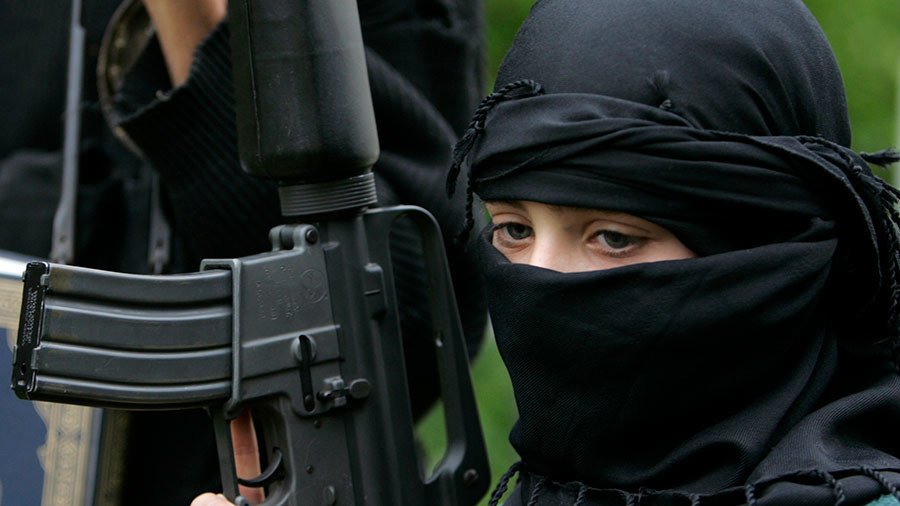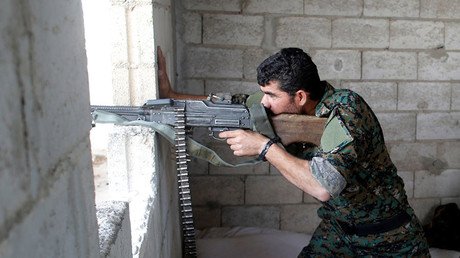Radicalized wives & kids of ISIS fighters ‘must be identified as jihadis’ – German intel chief

While many of the male fighters who travelled to fight for Islamic State have yet to return, the head of Germany’s domestic intelligence agency has other worries. Hans-Georg Maassen is greatly concerned with the threat posed by their wives and children.
"There are children who have been brainwashed and highly radicalized at 'schools' in IS-held areas. It's a problem for us because many of these kids and teenagers can sometimes be dangerous,” Maassen warned Sunday in an interview with the Deutsche Presse Agentur (dpa) news agency, as cited by Süddeutsche Zeitung.
Massen added that women returning to Germany from Islamic State (IS, formerly ISIS) strongholds “had become so radicalized and identify so deeply with IS-ideology that, by all accounts, they must also be identified as jihadis… we have to keep them in our sights.”
Pro-ISIS group calls on lone wolves to target children in Western countries - monitoring site https://t.co/lqVCSYq4oXpic.twitter.com/rbsY0emqf3
— RT (@RT_com) November 30, 2017
IS launched its insurgency, which sought to carve out its own caliphate in Iraq and Syria, in 2014. Since then, approximately 950 German jihadis, 20 percent of whom were female, travelled to the Levant to fight for the Islamist group, reports Deutsche Welle. Roughly one third of these 950 German fighters have already returned home, the majority of whom are women and children.
"We haven't seen any significant flows of male fighters returning home," Maassen said. "We assume that Westerners still fighting with IS to this day intend to stay there until the very end, and will only then seek to settle in Europe once again."
German media reported last week that the government was considering plans to repatriate the children of German IS fighters, according to Deutsche Welle. Roughly 700 Islamists are currently estimated to live in Germany, and are believed to pose a significant security risk.
Afghan & Pakistani asylum seekers cleared of ISIS ties, deported anyway https://t.co/jBb5RzuGcdpic.twitter.com/laRFYdurtA
— RT America (@RT_America) November 27, 2017
IS has suffered near-total military defeat in the Middle East, holding on to just a handful of minor strongholds along the Iraq-Syria border. However, while its military power has dwindled, Maassen warns that the threat posed by IS terrorists is far from over.
“They are saying: ‘You don’t have to travel to Syria and Iraq to fight. You can carry out jihad at home, as well,’” Maassen added. “Therefore, many of those who had already packed their suitcases to travel to these jihadi territories decided to stay at home instead.”
The issue of ISIS wives and widows, who along with their children return home, remains controversial. While some see them as victims, others believe them to be terrorists who should be punished for their crimes.
“These are people who are dangerous extremist terrorists. All of our countries should support Syria and Iraq in ensuring that these people are properly prosecuted and brought to justice,” Andre Walker, a political commentator for the New York Observer, told RT back in September.
Willing terrorists or victims? DEBATE over stranded wives of ISIS fighters https://t.co/uyohirTwLb
— RT (@RT_com) September 12, 2017
Seeking vengeance and persecuting the wives of ISIS fighters, however, might backfire and result in the further spread of extremist ideologies across Europe, British political commentator Mo Ansar believes. “Certainly the wives and children are innocent victims in this play,” he told RT.
“The answer is not disenfranchising them and making them stateless. All that is going to do is increase the number of people who are going to be turning to terror as a way of retribution towards the West,” Ansar said.














